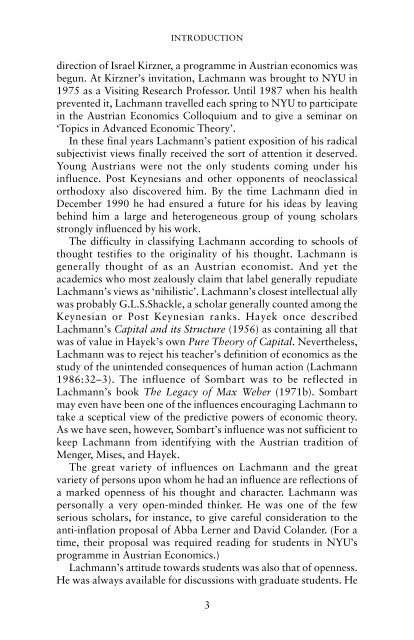Subjectivism and Economic Analysis: Essays in memory of Ludwig ...
Subjectivism and Economic Analysis: Essays in memory of Ludwig ...
Subjectivism and Economic Analysis: Essays in memory of Ludwig ...
Create successful ePaper yourself
Turn your PDF publications into a flip-book with our unique Google optimized e-Paper software.
INTRODUCTIONdirection <strong>of</strong> Israel Kirzner, a programme <strong>in</strong> Austrian economics wasbegun. At Kirzner’s <strong>in</strong>vitation, Lachmann was brought to NYU <strong>in</strong>1975 as a Visit<strong>in</strong>g Research Pr<strong>of</strong>essor. Until 1987 when his healthprevented it, Lachmann travelled each spr<strong>in</strong>g to NYU to participate<strong>in</strong> the Austrian <strong>Economic</strong>s Colloquium <strong>and</strong> to give a sem<strong>in</strong>ar on‘Topics <strong>in</strong> Advanced <strong>Economic</strong> Theory’.In these f<strong>in</strong>al years Lachmann’s patient exposition <strong>of</strong> his radicalsubjectivist views f<strong>in</strong>ally received the sort <strong>of</strong> attention it deserved.Young Austrians were not the only students com<strong>in</strong>g under his<strong>in</strong>fluence. Post Keynesians <strong>and</strong> other opponents <strong>of</strong> neoclassicalorthodoxy also discovered him. By the time Lachmann died <strong>in</strong>December 1990 he had ensured a future for his ideas by leav<strong>in</strong>gbeh<strong>in</strong>d him a large <strong>and</strong> heterogeneous group <strong>of</strong> young scholarsstrongly <strong>in</strong>fluenced by his work.The difficulty <strong>in</strong> classify<strong>in</strong>g Lachmann accord<strong>in</strong>g to schools <strong>of</strong>thought testifies to the orig<strong>in</strong>ality <strong>of</strong> his thought. Lachmann isgenerally thought <strong>of</strong> as an Austrian economist. And yet theacademics who most zealously claim that label generally repudiateLachmann’s views as ‘nihilistic’. Lachmann’s closest <strong>in</strong>tellectual allywas probably G.L.S.Shackle, a scholar generally counted among theKeynesian or Post Keynesian ranks. Hayek once describedLachmann’s Capital <strong>and</strong> its Structure (1956) as conta<strong>in</strong><strong>in</strong>g all thatwas <strong>of</strong> value <strong>in</strong> Hayek’s own Pure Theory <strong>of</strong> Capital. Nevertheless,Lachmann was to reject his teacher’s def<strong>in</strong>ition <strong>of</strong> economics as thestudy <strong>of</strong> the un<strong>in</strong>tended consequences <strong>of</strong> human action (Lachmann1986:32–3). The <strong>in</strong>fluence <strong>of</strong> Sombart was to be reflected <strong>in</strong>Lachmann’s book The Legacy <strong>of</strong> Max Weber (1971b). Sombartmay even have been one <strong>of</strong> the <strong>in</strong>fluences encourag<strong>in</strong>g Lachmann totake a sceptical view <strong>of</strong> the predictive powers <strong>of</strong> economic theory.As we have seen, however, Sombart’s <strong>in</strong>fluence was not sufficient tokeep Lachmann from identify<strong>in</strong>g with the Austrian tradition <strong>of</strong>Menger, Mises, <strong>and</strong> Hayek.The great variety <strong>of</strong> <strong>in</strong>fluences on Lachmann <strong>and</strong> the greatvariety <strong>of</strong> persons upon whom he had an <strong>in</strong>fluence are reflections <strong>of</strong>a marked openness <strong>of</strong> his thought <strong>and</strong> character. Lachmann waspersonally a very open-m<strong>in</strong>ded th<strong>in</strong>ker. He was one <strong>of</strong> the fewserious scholars, for <strong>in</strong>stance, to give careful consideration to theanti-<strong>in</strong>flation proposal <strong>of</strong> Abba Lerner <strong>and</strong> David Col<strong>and</strong>er. (For atime, their proposal was required read<strong>in</strong>g for students <strong>in</strong> NYU’sprogramme <strong>in</strong> Austrian <strong>Economic</strong>s.)Lachmann’s attitude towards students was also that <strong>of</strong> openness.He was always available for discussions with graduate students. He3

















